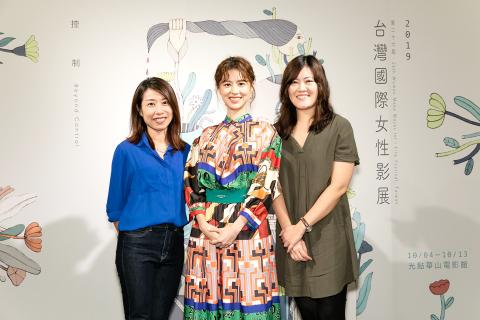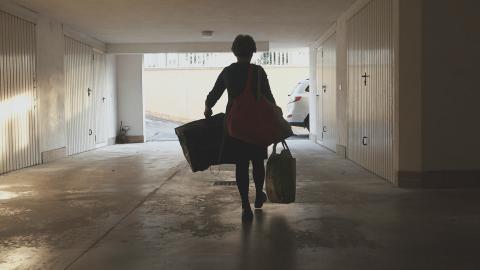Before she was the director of the Women Make Waves Film Festival, Pecha Lo (羅珮嘉) worked at the Public Television Service. There, she experienced sexism and witnessed sexual harassment.
“I realized that male employees would use many methods to threaten the girls, whether it was something as small as making them get meals, or as big as sexual harassment,” Lo, now 40, tells the Taipei Times.
Lo and her colleagues traded notes on predatory behavior, such as when a male producer insisted that a female assistant share a hotel room with him during an overnight shoot.

Photo courtesy of Women Make Waves Film Festival
The “very masculine” environment of the television station also meant that regardless of their qualifications or ambitions, female employees were not allowed to touch the cameras. But with their jobs at stake, there were few courses of action.
“Either you left, or you just quietly tolerated it. Those felt like the only two options,” says Lo.
That was almost two decades before the #MeToo movement exposed an epidemic of sexual harassment and abuse around the world. The reckoning brought by that movement is central to the program of this year’s film festival, which opens Friday.

Photo courtesy of Women Make Waves Film Festival
“After #MeToo” — one of the festival’s 11 sections — will delve into divisive issues such as victim-blaming, doubts about women’s testimonies and ambiguous situations that can amount to sexual harassment.
With Hollywood forming part of the epicenter of the #MeToo movement, the festival’s “Rocking Cinema History” section is particularly timely. Four documentaries will dissect workplace sexism and women’s on-screen representation in recent American, Australian and European cinema.
Even the festival’s overarching theme, “Beyond Control,” is a nod to how the #MeToo movement has prioritized women regaining control over their bodies and experiences.

Photo courtesy of Women Make Waves Film Festival
BREAKTHROUGHS
Although the decision to focus on #MeToo was obvious to Lo, who is also Director-General of the Taiwan Women’s Film Association, she is aware that the festival risks operating in a bubble of feminism.
The #MeToo movement has so far failed to gain mainstream momentum in Taiwan, despite the work of many women’s rights organizations and the existence of a high-profile offender — Golden Horse-nominated film director Doze Niu (鈕承澤), who in February was charged with sexually assaulting a female crew member.
Lo theorizes that this might be because Taiwan still lacks a public face to the movement, in the sense of a sexual assault survivor who can tell her story in a way that resonates with the wider public.
She adds that although sexual harassment and assault do happen here, “generally, the pressure could be relatively less” than in other countries, resulting in less “aggressive” efforts to end such behaviors.
Wary of building an echo chamber, the festival organizers conduct outreach through community screenings around the country. In post-screening discussions, Lo has had sobering encounters with other, usually older women.
“They will say, ‘Don’t come and influence my daughter-in-law and tell her that if her husband hits her, he’s wrong. Husbands are going to hit their wives, because when we were younger, we were also hit. Since we could bear it, why can’t my daughter-in-law?’” she says.
While the cause of gender equality remains pressing, Lo welcomes the fact that not everyone attends the festival for such principled reasons. Some audiences are primarily interested in the artistic and historic value of the films, she says.
EMBRACING DIVERSITY
The festival is learning to embrace this group of viewers, who have also contributed to its longevity. Now in its 26th year, Women Make Waves is the second-oldest film festival in Taiwan, behind only the Golden Horse Film Festival.
A case in point is this year’s “Lady Avengers: Asia, Women, and Chainsaws” section showcasing films from Hong Kong, Japan, South Korea and Taiwan, in which female protagonists revel in exacting murderous revenge for various forms of injustice. Three of the five films are directed by men.
Lo says that “Lady Avengers,” which consists of films originally released between 1960 and 1981, would have been unimaginable when she first started directing the festival seven years ago.
Back then, the program followed a formula of low-budget indie films that dealt squarely with social issues affecting women. There was staunch resistance to screening any works by male directors, and an emphasis on premieres.
The vast majority of directors featured at this year’s festival continue to be female. They include the Lebanese journalist and filmmaker Jocelyne Saab and American lesbian visual artist Barbara Hammer, both of whom have been given their own retrospectives.
But as the festival matures, Lo anticipates moving away from the latest releases and exclusively female line-up to explore film history and more diverse perspectives, including that of select male directors.
“It’s important to break the rules of the game when necessary,” she says.
As a single working woman, this newfound sense of confidence also extends from Lo’s professional to her personal life.
“Since turning 40 I feel super-confident,” she says. “Like I’ve found the right of control over my own body.”

One of the biggest sore spots in Taiwan’s historical friendship with the US came in 1979 when US president Jimmy Carter broke off formal diplomatic relations with Taiwan’s Republic of China (ROC) government so that the US could establish relations with the People’s Republic of China (PRC). Taiwan’s derecognition came purely at China’s insistence, and the US took the deal. Retired American diplomat John Tkacik, who for almost decade surrounding that schism, from 1974 to 1982, worked in embassies in Taipei and Beijing and at the Taiwan Desk in Washington DC, recently argued in the Taipei Times that “President Carter’s derecognition

This year will go down in the history books. Taiwan faces enormous turmoil and uncertainty in the coming months. Which political parties are in a good position to handle big changes? All of the main parties are beset with challenges. Taking stock, this column examined the Taiwan People’s Party (TPP) (“Huang Kuo-chang’s choking the life out of the TPP,” May 28, page 12), the Democratic Progressive Party (DPP) (“Challenges amid choppy waters for the DPP,” June 14, page 12) and the Chinese Nationalist Party (KMT) (“KMT struggles to seize opportunities as ‘interesting times’ loom,” June 20, page 11). Times like these can

June 23 to June 29 After capturing the walled city of Hsinchu on June 22, 1895, the Japanese hoped to quickly push south and seize control of Taiwan’s entire west coast — but their advance was stalled for more than a month. Not only did local Hakka fighters continue to cause them headaches, resistance forces even attempted to retake the city three times. “We had planned to occupy Anping (Tainan) and Takao (Kaohsiung) as soon as possible, but ever since we took Hsinchu, nearby bandits proclaiming to be ‘righteous people’ (義民) have been destroying train tracks and electrical cables, and gathering in villages

Dr. Y. Tony Yang, Associate Dean of Health Policy and Population Science at George Washington University, argued last week in a piece for the Taipei Times about former president Ma Ying-jeou (馬英九) leading a student delegation to the People’s Republic of China (PRC) that, “The real question is not whether Ma’s visit helps or hurts Taiwan — it is why Taiwan lacks a sophisticated, multi-track approach to one of the most complex geopolitical relationships in the world” (“Ma’s Visit, DPP’s Blind Spot,” June 18, page 8). Yang contends that the Democratic Progressive Party (DPP) has a blind spot: “By treating any